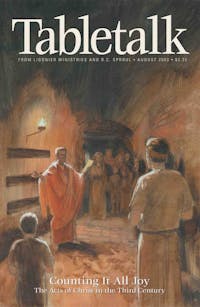
Request your free, three-month trial to Tabletalk magazine. You’ll receive the print issue monthly and gain immediate digital access to decades of archives. This trial is risk-free. No credit card required.
Try Tabletalk NowAlready receive Tabletalk magazine every month?
Verify your email address to gain unlimited access.
I’m not sure we’re sufficiently awed by our own faith. As we watch the world’s religions clash all around the globe, and as ecumenists of varying stripes peddle their soft soap, we miss what makes us stand out like a sore thumb. Certainly, vis a vis most eastern religions, one unusual element of the Christian faith is that it claims to be true, exclusively. But Islam makes much the same claim. Also, Christians seek to make converts across the globe. But following in our footsteps, or sometimes walking in front of us, are the Mormons. So what is it about the Christian faith that we would die for? What makes us cling to our faith as if our eternal lives depended upon it?
That which separates the Christian faith is forgiveness. No other religion offers this astounding promise: Repent and believe, and you will be saved. This is why our fathers were able to face hungry lions and metal-clad gladiators in Rome’s stadia.
We must not miss the corollary irony. That which enabled thousands to spit in the face of death is the self-same quality that led those who survived in their fidelity to embrace those who survived in their infidelity. It was because of the promise of forgiveness to those who repent, because this was and is the essence of the faith, that the lapsi, those whose flesh was weak in the face of Rome, were welcomed back into the fold.
Scripture gives us a picture of the same. Peter’s three-fold denial of Christ did not happen, the Bible tells us, in order to teach Peter humility. It did not happen to inspire future generations to be more courageous. Rather, it happened so that, as Jesus enjoined him, Peter might strengthen the brethren (Luke 22:32). Peter not only was forgiven his trespasses, he was taught to forgive those who trespass.
We walk a narrow road. We do not want to belittle the seriousness of sin. We especially do not want to belittle the betrayal of Christ. But we must remember that every sin we commit is likewise a betrayal. We turn on Christ not when our lives are at stake, but when our reputations might take a hit. We must learn to stand firm. But we will stand firm only as we remember what makes our faith so precious, that our sins can be forgiven. Coram Deo, before the face of God, we have peace. That we must hold onto, no matter the cost.
